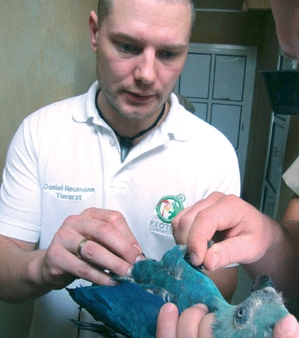 Daniel Neumann performing artificial insemination in a Spix’s macaw at AWWP.Pioneering efforts by Qatar’s Al Wabra Wildlife Preservation to conserve the extinct-in-the-wild Spix’s macaw have achieved a key milestone with the world’s first artificial insemination in the parrot species native to Brazil, under a partnership with a German firm.
Daniel Neumann performing artificial insemination in a Spix’s macaw at AWWP.Pioneering efforts by Qatar’s Al Wabra Wildlife Preservation to conserve the extinct-in-the-wild Spix’s macaw have achieved a key milestone with the world’s first artificial insemination in the parrot species native to Brazil, under a partnership with a German firm.
Founded by Sheikh Saoud bin Mohamed bin Ali al-Thani, AWWP, which has been a champion in Spix’s macaw conservation for over a decade, holds over 77% (64 out of 83) of the world population of the bird and is actively involved in grassroots conservation in its home country.Given that a narrow genetic pool is one of the biggest problems for the worldwide breeding programme, as it causes suboptimal fertility in the population, researchers from AWWP together with Parrot Reproduction Consulting from Germany decided to help the species through artificial insemination.
As soon as a female laid her first egg, the team took sperm from a male and immediately deposited it by micro-capillary tube into the oviduct of the female Spix hoping to fertilise the next egg to be laid before the egg shell would be formed.“This process was repeated after the second and third eggs were laid as Spix are known to often lay four eggs in a clutch,” Dr Tim Bouts, director of AWWP told Gulf Times.
After seven days the eggs were candled to see if they were fertile. Two - out of the seven artificially inseminated - proved to be fertile and developed well in the incubator.The eggs were checked daily for development and as the chicks were growing their heart rates monitored in the egg until they hatched after 26 days.
The first chick to hatch was called ‘Neumann,’ named after veterinarian Daniel Neumann, from Parrot Reproduction Consulting, the executor of the first successful artificial insemination in Spix.
“I have performed many artificial inseminations in parrots over the years but none have been as special as the ones in the Spix,” he said while recalling that as a boy, following the sad story of the disappearance of the Spix’s macaw in the wild, he dreamt about becoming involved in its conservation.This success story is hopefully the beginning of the recovery of the species in the wild as successful breeding in captivity with a wide genetic pool will be the most important tool for its survival.
The blue macaw co-ordinator in AWWP, Dr Cromwell Purchase, said: “Since we know that artificial insemination is possible in this species, we have a lot more possibilities for breeding as we can use different males and females to make up the best possible genetic combinations.”
The next step will be to perform artificial insemination in Spix’s macaws already in Brazil and to set up an AWWP breeding facility inside Brazil.
Dr Bouts pointed out that currently AWWP manages 10 out of 11 Spix’s macaws owned by the Brazilian government in NEST, a private breeding facility in Sao Paulo State. “We need to kick-start breeding and possibly artificial insemination in their native country as soon as possible. We are also looking to set up our own breeding facility and send some birds from Qatar to Brazil.”
AWWP, well-recognised and respected globally for its focus on breeding and protecting threatened species, is non-commercial and not open to the public. A member of the European Association of Zoos and Aquaria, AWWP has so far this year bred four Spix’s macaw chicks, including the two conceived by artificial insemination, of three different mothers.
AWWP, which owns 2,380 hectares of prime Spix’s habitat near the town of Curaçá in the Caatinga in Brazil, is involved in habitat restoration to prepare the area for reintroduction of the Spix’s macaw in the wild.
AWWP spends over QR1mn each year for Spix’s macaw conservation in Qatar and Brazil.